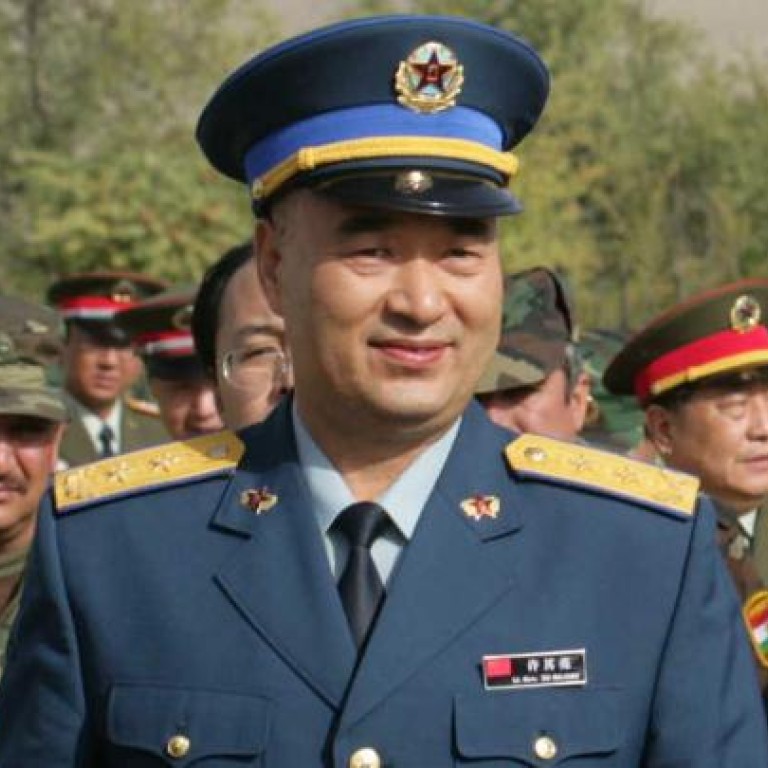
Air force commander Xu Qiliang looks set for elevation
Xu Qiliang is favourite to become a vice-chairman of the powerful Central Military Commission, despite rumours of conflicts with Hu Jintao
The youngest member of the Central Military Commission (CMC), 62-year-old PLA air force commander General Xu Qiliang , is a front runner to become one of the commission's two professional vice-chairmen next month.

Chang, 63, is generally considered a protégé of CMC chairman Hu Jintao .
If Xu does become a CMC vice-chairman after the party's 18th national congress, which will open on November 8, he will also become a member of the party's decision-making Politburo, which will rule China for the next five years.
For years, "princelings" - the children of communist veterans - have dominated high-ranking positions in the PLA.
There have long been rumours that Xu is one of them, and owes his rise to being the son of late lieutenant general Xu Lefu , a former deputy political commissar of the air force.
But the politically savvy Xu Qiliang has said he comes from a peasant family and has been distancing himself from the princeling group following the downfall of former Chongqing party secretary Bo Xilai .
Two rising military stars close to Bo have seen their chances of becoming director of the PLA's General Political Department and securing membership of the CMC diminish in the wake of Bo's ousting. They are General Liu Yuan , the political commissar of the General Logistics Department, and General Zhang Haiyang , the political commissar of the Second Artillery Corps - the PLA's strategic missile force.
A Beijing-based military source said that Xu Qiliang was born into an ordinary family in Shandong in 1950, and that Xu Lefu's son was former senior colonel Xu Jinsheng , who retired from a mid-ranking position in the Beijing military area command a few years ago.
Xu Qiliang has been a Jiang protégé since the 1980s, when Jiang was Shanghai mayor and then the municipality's party secretary. Xu was a senior air force officer in Shanghai at the time.
Jiang still wields huge influence in the party leadership transitions, even though he retired from his last formal post as CMC chairman in September 2004.
Xu was first identified as a rising military star in 1992, when he was "elected" an alternate member of the party's Central Committee at the 14th national congress at the age of 42. Two years later, he was named air force chief of staff.
Xu then became air force commander of the northeastern Shenyang military area command in 1999 and a deputy chief of general staff five years later. He became air force chief and a member of the CMC in 2007.
Hu appears to have had a chequered relationship with Xu for the past five years. One incident, which sparked widespread discussion at home and abroad, saw then US defence secretary Dr Robert Gates remark early last year that Hu appeared to have been in the dark when Gates raised a question about the first test flight of China's J-20 stealth fighter in Chengdu just hours before a meeting in Beijing.
That led to intense speculation about possible discord between the PLA's civilian leaders and their military subordinates.
Antony Wong Dong, a PLA-watcher based in Macau, said: "This tiny clue has revealed a lot of hidden and underlying conflicts between Hu and Xu, even though the official Chinese media later tried to clarify that Gates had misread Hu's response."
Hu also appeared to snub a ceremony in Beijing in November 2009 to mark the 60th anniversary of the founding of the PLA air force, instead choosing to pay a visit to Malaysia and Singapore. That contrasts with his attendance at a naval review off Qingdao in April that year to celebrate the 60th anniversary of the founding of the PLA navy.
"Taking these two cases into account, I wonder how come Hu shows such little respect to the air force," Wong said, adding that this proved ties between Hu and Xu were strained.
Although low-profile outside the military, Xu appears to be not averse to befriending or serving retired senior officials.
During the opening ceremony for the biennial Zhuhai air show a couple of years ago, Xu bustled between former premier Li Peng and CMC vice-chairman General Guo Boxiong on the podium.
He whispered to Li and Guo every now and then, even though their seats were separated by those of other dignitaries.
Xu, who joined the air force as a trainee pilot in 1966 and went on to become an outstanding aviator, has long been a keen proponent of air-force modernisation.
In remarks at a ceremony to mark the signing of a deal to set up a pilot training programme jointly organised by the air force and Tsinghua University in September last year, Xu said: "As we turn a new page in the new century, we need a quality air force to better safeguard national security and interests, while the general public also expects sound air power as well."
Wong said Xu was a professional military leader with the vision to advance the air force's development.
He said that under Xu's leadership over the past five years, the air force had made remarkable progress in research and the development of a range of jet fighters.
"Xu has worked hard on the upgrading of military equipment and the quality of personnel training, aside from his insights on the need to build up a modern air force which strikes the correct offensive and defensive balance," Wong said.
He added that unlike the navy, the air force was able to match up against that of Japan, with almost twice as many jet fighters as the Japanese air force and a recent closing of a gap in pilot quality thanks to improvements in training.

